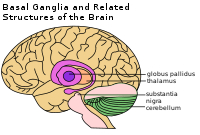UBERON:0002420: Difference between revisions
From FANTOM5_SSTAR
No edit summary |
No edit summary |
||
| Line 18: | Line 18: | ||
|has_quality= | |has_quality= | ||
|located_in= | |located_in= | ||
|part_of= | |part_of=UBERON:0010011 | ||
|property_value=IAO:0000412 http://purl.obolibrary.org/obo/uberon.owl | |property_value=IAO:0000412 http://purl.obolibrary.org/obo/uberon.owl | ||
|is_obsolete= | |is_obsolete= | ||
|preceded_by= | |preceded_by= | ||
}} | }} | ||
Revision as of 13:32, 27 June 2012
| Name: | basal ganglion | |
|---|---|---|
| Definition: | "one of a group of nuclei in the brains of vertebrates, situated at the base of the forebrain and strongly connected with the cerebral cortex, thalamus and other areas.ganglion in the head. The main components of the basal ganglia are the striatum, pallidum, substantia nigra, and subthalamic nucleus[WP]. Subcortical masses of gray matter in the forebrain and midbrain that are richly interconnected and so viewed as a functional system. The nuclei usually included are the caudate nucleus (caudoputamen in rodents), putamen, globus pallidus, substantia nigra (pars compacta and pars reticulata) and the subthalamic nucleus. Some also include the nucleus accumbens and ventral pallidum[NIF]." [Wikipedia:Basal_ganglia] | |
| Xrefs: |
| |
| Synonyms: |
"basal ganglia" RELATED PLURAL [] "basal ganglion of telencephalon" EXACT [] "basal nucleus" RELATED [MA:0000184] "nuclei basales" RELATED LATIN [Wikipedia:Basal_ganglia] | |
| Comments: | Editor note: it is necessary to introduce two classes, one representing an individual basal ganglion, another representing the aggregate structure, in order to have consistent classification amongst AOs (e.g. in MA the aygdala is part of the BG, in FMA and BTO it is a subclass). Apart from achieving this consistency, the value of having two distinct classes is questionable, since the BG-plural is trivially the set of all BGs-singular. it would be better for all AOs to decide on one single way of doing this. Do not merge until this is done. | |
| Subset: | uberon_slim |
Ontology association<br>Each term has an is_a parent in the Uberon Ontology, which has a linkage to an another entity and FANTOM5 samples.Libraries were grouped into mutually exclusive facets according to the FANTOM5 sample ontology mapping to UBERON ontologies.<br><br>link to ontology dataset<br>data
Parents
| is_a: | UBERON:0003528(brain grey matter),UBERON:0007245(nuclear complex of neuraxis) |
|---|---|
| part_of: | UBERON:0010011(collection of basal ganglia) |
Children
| is a: | UBERON:0001876 (amygdala) |
|---|---|
| disjoint from: | UBERON:0000045 (ganglion) |
| part of: | UBERON:0000369 (corpus striatum),UBERON:0001875 (globus pallidus),UBERON:0002038 (substantia nigra),UBERON:0002435 (striatum),UBERON:0006514 (pallidum) |
Ontology Tree: Loaded from BioPortal
Ontorolgy tree(Small window open)
FF samples<br>It includes FANTOM5 samples that overlay the Uberon ontology
Human (Homo sapiens)
- 10037-101F1 (nucleus accumbens, adult, pool1)
- 10151-102I7 (amygdala, adult, donor10252)
- 10152-102I8 (putamen, adult, donor10252)
- 10158-103A5 (substantia nigra, adult, donor10252)
- 10161-103A8 (globus pallidus, adult, donor10252)
- 10164-103B2 (caudate nucleus, adult, donor10252)
- 10167-103B5 (amygdala - adult, donor10196)
- 10175-103C4 (globus pallidus - adult, donor10196)
- 10176-103C5 (putamen, adult, donor10196)
- 10177-103C6 (caudate nucleus - adult, donor10196)
... further results Mouse (Mus musculus)
- 10037-101F1 (nucleus accumbens, adult, pool1)
- 10151-102I7 (amygdala, adult, donor10252)
- 10152-102I8 (putamen, adult, donor10252)
- 10158-103A5 (substantia nigra, adult, donor10252)
- 10161-103A8 (globus pallidus, adult, donor10252)
- 10164-103B2 (caudate nucleus, adult, donor10252)
- 10167-103B5 (amygdala - adult, donor10196)
- 10175-103C4 (globus pallidus - adult, donor10196)
- 10176-103C5 (putamen, adult, donor10196)
- 10177-103C6 (caudate nucleus - adult, donor10196)
Enrichment analysis: top 100 FFCP enriched with this ontology term TOP 100 FANTOM5 Cage Peaks enriched with UBERON:0002420 (basal ganglion), sorted by p-values <br>Analyst: Hideya Kawaji<br><br>link to source dataset <br>human : data <br>mouse : data
 200px-Basal_Ganglia_and_Related_Structures.svg.png]
200px-Basal_Ganglia_and_Related_Structures.svg.png]